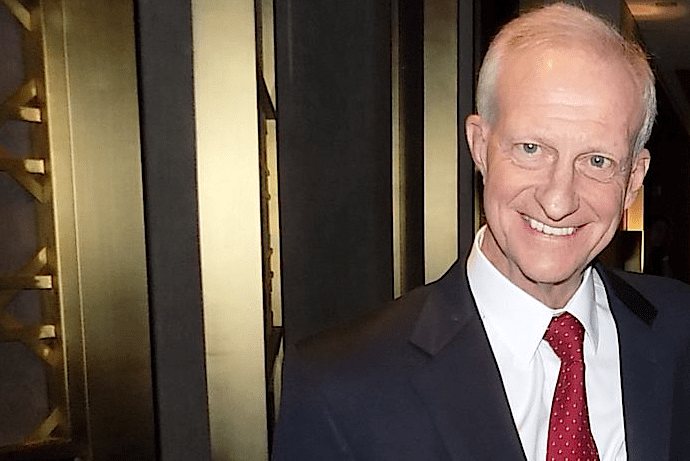Top 2019 News in Georgetown: Evans, Jelleff, Bikes, Scooters
By • December 23, 2019 One Comment 1186

The Georgetowner has been following a number of important evolving topics in Georgetown. Many are very complicated and far from resolved, but here’s a quick review of several: access to playing fields, the plans for the Jelleff Center’s reconstruction, the increase in e-bikes and scooters and the fate of Council member Jack Evans.
Ward 2 Council Member Jack Evans Faces Expulsion
“It’s been a terrible year,” Ward 2 Council member Jack Evans said at Georgetown University’s annual Christmas party on Dec. 11. He had just been describing the accident the week before at M and 28th Streets, when an Uber driver crashed into his well-known 2010 blue Chevrolet Sebring and broke its axle. The car will survive, but Evans’s position as the Council’s longest-serving member may not. On Dec. 3, an ad hoc committee of the full Council — minus Evans — voted unanimously to recommend expelling him from the body. The move needs a second vote, which may happen by the end of the year. If so, it would be the first time in D.C. history that a sitting member has been expelled.
Evans’s terrible year started last December, when the Washington Post reported that in October of 2016 he had received stock in a company just as he presented legislation to the Council that would benefit the firm significantly. Evans showed that he returned the stock and withdrew the legislation immediately. But in February, a federal grand jury issued a subpoena for documents; Evans’s house was raided by FBI agents in June.
In March, the Post revealed that in written proposals Evans offered his “connections and influence” as a private consultant to law firms doing business with the District. In June, an ethics investigation commissioned by the Metro board, which Evans headed, found evidence of “multiple violations” regarding conflicts of interest. On June 27, Evans left the Metro board when his term as chairman expired. In July, the Council stripped Evans of the chairmanship of its Committee on Finance and Revenue. In November, the Council released a comprehensive report of accusations; Evans’s lawyers attempted to refute the charges, but, on Dec. 3, the Council voted to recommend expulsion. Evans could resign, but he is still facing ongoing investigations by law enforcement agencies. “I have a lot of big decisions to make in the next few weeks,” Evans told The Georgetowner.
Maret Contract to Use Jelleff Field Renewed
The administration and usage of two of Georgetown’s almost unknown athletic fields became big news in 2019 — and likely will be a major issue in the Ward 2 Council seat election in 2020. In June, a 10-year contract for priority usage and maintenance of the lighted playing field at the Jelleff Recreation Center at 3265 S St. NW, next to Safeway, was up for renewal between the Department of Parks and Recreation and the private Maret School. In 2009, Maret had committed over $2 million to rebuild the deteriorating field and fencing, as well as the pool and lights, in exchange for 12 weeks of preferred use on school days in the fall and spring. But a renewed contract with Maret until 2029, in exchange for some $1 million to maintain and renew the field, was disputed by Advisory Neighborhood Commission 2E and by a number of youth athletic groups, especially those from Hardy Middle School and School Without Walls. The demographics of Georgetown have shifted, with more families, many with children, residing here, resulting in a greater interest in sports. The new contract with Maret was signed, but the controversy caused the city to focus on another neighborhood playing field as an alternative: the field connected with the Duke Ellington School of the Arts.
$25 Million for Jelleff Center Reconstruction
In January of 2019, the discussions about Jelleff also involved the recreation center building. Built in 1953, it has housed the Boys & Girls Clubs on the ground floor and a heavily used basketball court on the second floor for decades. In 2018, the city committed $7 million to make the facility compliant with the Americans with Disabilities Act. But community groups and the center‘s longtime Director Bob Stowers protested that that wasn’t enough to meet the needs of the area’s growing population of senior citizens, families and youth and adult sports organizations. “We need a real community center as in most every other part of the city,” Stowers argued. By December, Mayor Muriel Bowser had committed $25 million for a new building. “Just tell us what you want,” she said.
More E-Scooters, E-Bikes, Bike Lanes Coming
In 2019, a greater reliance on bikes, scooters and ride-sharing services to get around Georgetown and the city became visibly evident. Goals for alternatives to the private car doubled in 2019 and will double again for 2020. The city issued new contracts to two electronic-bike providers for up to 2,500 vehicles each. Four companies were given permits to supply up to 10,000 e-scooters, with a total of 20,000 available by the summer of 2020. Safety concerns, both for riders and pedestrians — including sidewalk and street clutter from abandoned vehicles — are also rising. Three people, two on e-bikes and one on an e-scooter, were killed in 2019 so far. The city is pledging to create an additional 20 miles of protected bike lanes in three years, double the number planned in 2019. But that could lead to increasing problems with parking availability for visitors to the District’s restaurants and shops.


DC taxpayers bought Jelleff for $15 million. DC taxpayers are going to pay to renovate Jelleff Rec Center for $25 million. Yet Maret, a $45k/year private school with 40% of its students from Maryland and Virginia, will hog access to Jelleff during the most popular afterschool hours for nearly 20 years by paying a bargain price of $95,000 not available to any other school. That’s a terrible deal by any rationale person’s standards.